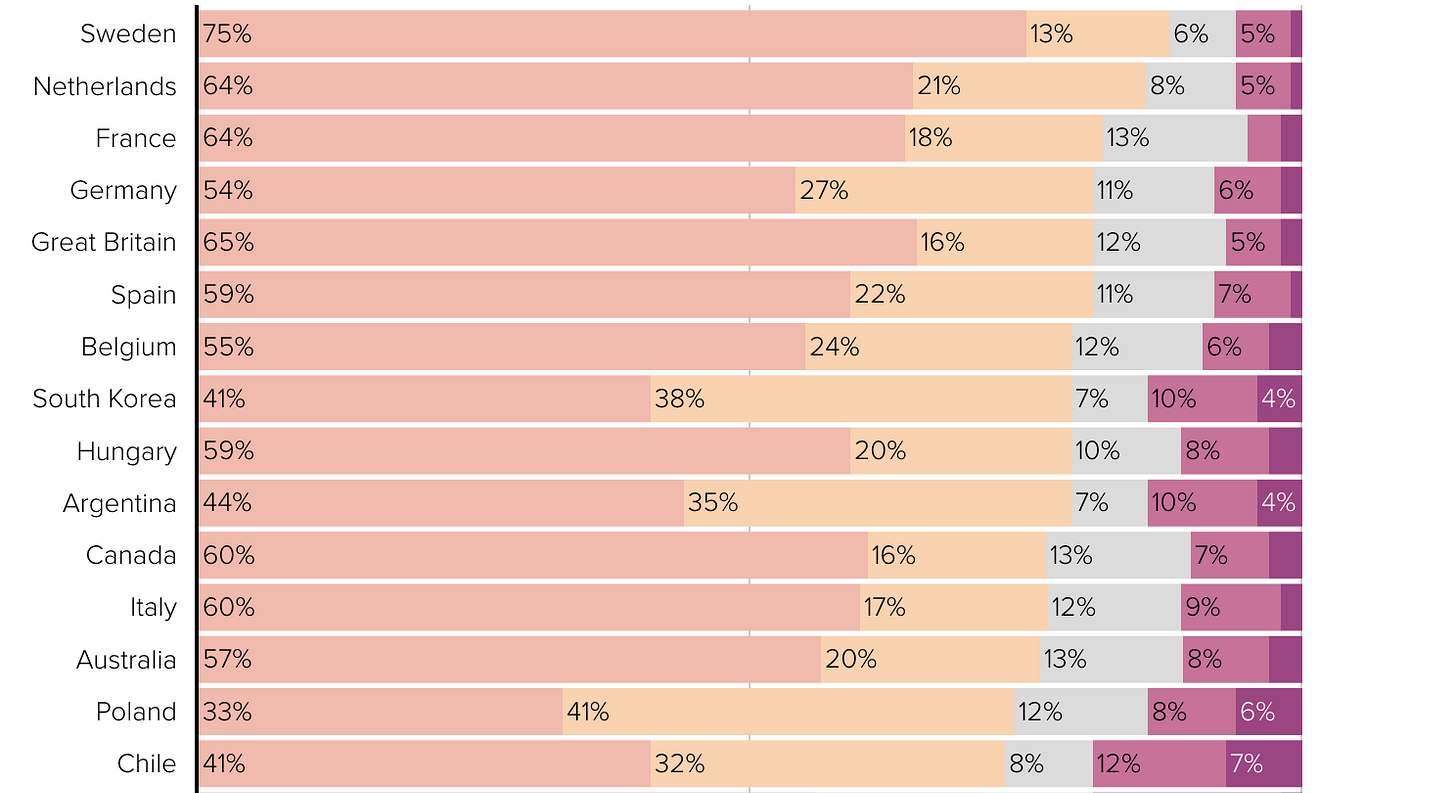Happy Friday!
This week I was briefly diverted from book leave by the leaked US Supreme Court judgement overturning Roe vs Wade, the 1970s Supreme Court ruling which guaranteed Americans’ right to an abortion. I think it’s reasonable to argue that Roe was always built on shaky foundations, and invoking a right to privacy was a bad way to enshrine abortion rights in law (Ruth Bader Ginsburg thought so), but that argument only takes you so far, because other rights in the US are built on shifting sands too.
Here in Britain, the Equality Act 2010 outlines a series of “protected characteristics,” and asserts that discrimination is generally illegal on the basis of age, disability, gender reassignment, marriage and civil partnership, pregnancy and maternity, race, religion or belief, sex, and sexual orientation. (I say “generally” because there are exceptions: if you’re advertising for sperm donors it’s not sex discrimination to exclude people who can’t produce sperm).
In the US, by contrast, new discrimination protections tend to spring from creative interpretations of century-and-a-half-old bits of the constitution, or creative interpretations of half-a-century-old bits of primary legislation. I say this with love, but it’s no way to run a country.
Roe, Obergefell (which legalised gay marriage) and Brown v Board of Education (which ruled that racially segregated schools were unconstitutional) all rely on the Fourteenth Amendment of 1868, which guarantees “equal protection”.
“No State shall make or enforce any law which shall abridge the privileges or immunities of citizens of the United States; nor shall any State deprive any person of life, liberty, or property, without due process of law; nor deny to any person within its jurisdiction the equal protection of the laws.”
Obviously, the 14th does not specifically mention gay marriage or racial desegregation, nor abortion rights. This is the judicial window which Samuel Alito has pried open with his draft opinion overturning Roe: the writers of the 14th amendment cannot possibly have envisioned that it would be used to mandate abortion access, he says. Spotted the obvious next step? “In the U.S., the rights of many marginalized groups are tied to the legal precedents established in the fight for abortion rights,” wrote my colleague Adam Serwer this week. “This opinion, if adopted, provides a path to nullifying those rights one by one.”
You think that arguing over a document from 1868 to decide people’s rights in 2022 is bad? It gets worse. What is even loopier to me is that Bostock, the 2020 Supreme Court ruling which prevented employers from firing gay or transgender employees, relies on the 1964 Civil Rights Act, which bars discrimination only “on the basis of sex,” i.e. it says nothing about LGBTQ people at all.
So preventing LGBTQ discrimination at work requires a creative interpretation of “on the basis of sex”: if you’re male and having a relationship with a male rather than a female, and you get fired for it, that’s sex-based discrimination. Ditto if you’re male and you get fired for wearing heels and lipstick, or for using a female name, that’s sex-based discrimination.
Neil Gorsuch, a Trump appointee, wrote the majority opinion in Bostock, arguing that “if the employer fires the male employee for no reason other than the fact that he is attracted to men,” that was clearly discrimination on the basis of sex. Ditto: “An employer who fires an individual for being homosexual or transgender fires that person for traits or actions it would not have questioned in members of a different sex.” I’m very glad Gorsuch delivered this ruling, but in my view it’s nowhere near as robust as the Equality Act, passed through the legislature, which also benefits from clearly outlining the various characteristics. The EA also allows for the possibility that rights might conflict sometimes.
The rulings in Bostock, Roe, Brown, Obergefell etc are a very wobbly edifice on which to construct the protection of human rights—and a uniquely American one, fetishising the constitution and relying on the vague words of legislators from an earlier era to rule on situations they never envisioned. Alito’s judgement mentions 13th century jurist Henry de Bracton’s opinion on abortion—but not that Bracton believed the Pope was the supreme arbiter of earthly laws. It cites Matthew Hale, a seventeenth century English barrister who executed two women for witchcraft. It mentions, too, the English jurist William Blackstone, who believed married women had no legal rights, and could therefore not own property or make contracts: “By marriage, the husband and wife are one person in law: that is, the very being or legal existence of the woman is suspended during the marriage . . . For this reason, a man cannot grant anything to his wife, or enter into covenant with her: for the grant would be to suppose her separate existence; and to covenant with her, would be only to covenant with himself”.
Help me out here. Modern America does not share these men’s opinions on witchcraft, papal infallibility or women’s legal existence. Why deify their thoughts on “quickening”? All of those men believed in monarchy, so why not defer to their wisdom and apologise for kicking out George III? Oh wait. In some circumstances you believe that attitudes, and laws, can change.
Argh. Still, this is what you get when you can’t pass new primary legislation: endless judicial chicanery and sleight of hand. Across the US, there is majority support for gay marriage, for abortion rights, for laws to prohibit firing people for being gay. But under the current system, these rights are fragile, and will always be fragile—the whim of a handful of lifetime appointees.

You can’t understand American politics (not that I do) without understanding that its systems are skewed towards minority rule. You can lose the popular vote and still be president; both George W Bush and Donald Trump did. The state of Wyoming (population: 578,759) is represented by the same number of senators as New York (population: 19.5 million). The filibuster means that “a party that represents a shrinking minority of voters can block almost all major legislation.” No wonder the Republicans seem unenthused by democracy; they don’t need it to get what they want.
It’s enough to make me wish America would just have a few national referendums. And I never thought I would wish for that.
Anyway, here’s my piece on what American feminists can learn from the abortion argument in Northern Ireland and Ireland, which offers some optimism and hope. But really, the only advice for America is: have you thought of trying a completely different political and legal system? I think it would really help sort this stuff out.
Helen
Jacob Rees-Mogg on Nannies and The Nanny State (Sunday Times, £)
Debbie behind the counter at Bowden’s village store says he drops in for bread, milk and eggs. I quiz him on the price of a loaf. “It depends on the bread but it’s a little over a pound.” He’s right. What about a litre of milk. “A litre?” he stares hard. “Do you mean a pint? Pretty much since I was a candidate it has been between 43p and 46p and it’s only very recently that it has gone up to 60p.”
Possibly it’s his insistence on sticking to imperial measures and his directness that local voters admire. He has been compared to William Gladstone for his support for individual liberty and loosening state controls, but the impression he gives is of a character not from the 1860s but the 1960s, frozen in the era just before Britain joined the EEC. He’s never not in a suit, usually from Savile Row. Slacks at weekends?
“Never, ever. I suppose casual is a tweed coat [jacket] rather than a business suit.”
People who turn their entire life into performance art are always intriguing, and as this sharp exchange reveals, “Jacob Rees-Mogg” is a persona every bit as constructed as, say, RuPaul or Sasha Fierce or Andy Warhol.
The larger question, of course, is why? I suppose one answer is that without the languorous drawl and hammed-up whiff of monocle, Jacob Rees-Mogg would be one of several dozen interchangeable posh rural squires in the Tory party. The persona has allowed him to be memorable, which for some people, is a higher goal than being likeable.
Quick Links
Here is the current Atlantic cover story, about the new “abortion underground” preparing for the post-Roe future. Here in Europe, Poland outlawed almost all abortion last year.
Here is the
opportunistprincipled conservative Dave Rubin telling women to move to state with abortion access if they care so much about it. The same Dave Rubin who is having two surrogate babies with his partner this autumn. I wonder what he thinks those women should do if they develop life-threatening complications in a state which has banned abortions even to save the life of the mother? Oh well, it won’t be his life at risk.I’m hosting Start the Week on Monday, with a Syrian architect, a disaster reconstruction expert, and a historian of the English Civil War. The topic is rebuilding.
See you next time!




